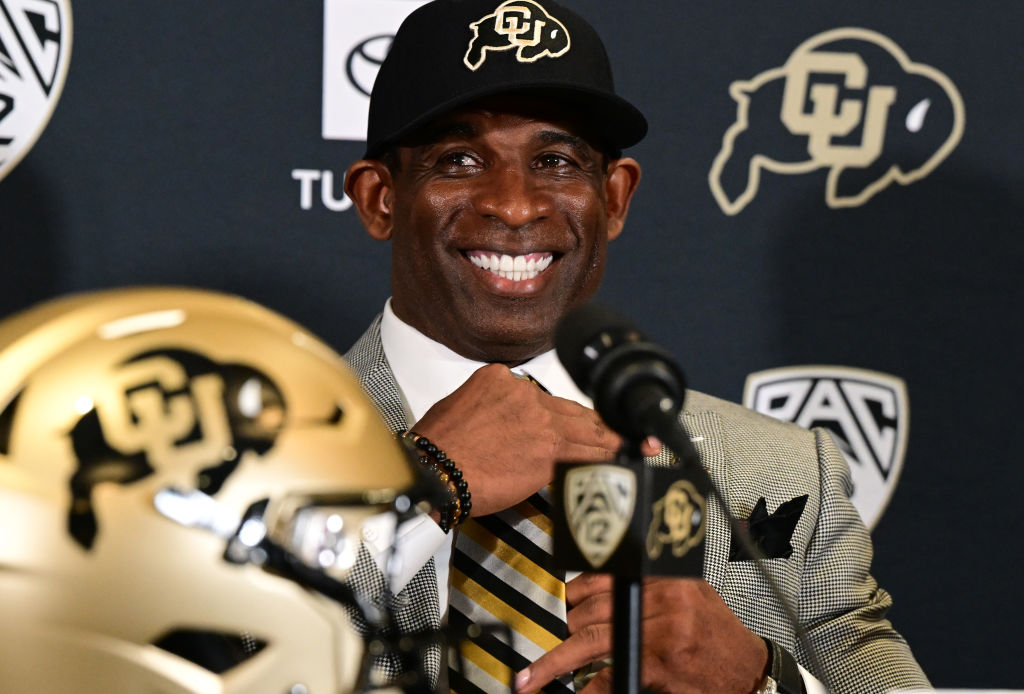OP-ED: Deion Sanders Was Never The Savior For HBCUs
Source: Helen H. Richardson/MediaNews Group/The Denver Post via Getty Images / Getty
Amid the three-day discourse surrounding Sanders’ departure from Jackson State to become the Head Football Coach at the University of Colorado, many seem to have either forgotten or ignored the truth about what happened during Sanders’ brief tenure in Jackson, Mississippi.
Sanders’ impact on HBCUs, HBCU athletics, and HBCU culture was undeniable and that deserves to be respected. He fought to provide new resources to his players at Jackson State, which included personal sacrifices like donating half his salary to that cause. His personality, bravado, and ability to win also brought extensive exposure to Jackson State and HBCUs across the country. Many major media outlets started creating HBCU verticals during Sanders’ time at Jackson State and networks like ESPN even sent College GameDay, their flagship college football show, to cover a couple of HBCU games during Sanders’s tenure including a game in Jackson this year against Southern University.
The increased attention from Sanders’ celebrity certainly helped. SWAC Commissioner Charles McClelland has even been on record saying that both revenue and sponsorships have increased for the SWAC since Sanders took over Jackson State.
However, let’s be very clear about what Sanders’ role actually was. He was a catalyst to an already progressing movement of HBCU visibility both on and off the playing surface. Institutions had already started to gain more exposure and attention from mainstream audiences before Sanders announced his intentions to go to Jackson State in September of 2020.
The Celebration Bowl, also known as the HBCU National Championship game, has been garnering millions of viewers on ABC every December since 2015. Enrollment at these institutions has shown upticks in growth since 2017 and some schools have even seen a 30 percent rise in applications from 2018-2021 during a time when the country’s overall undergraduate enrollment has declined. Corporate partners also have not been shy about spending money and creating relationships with these institutions because they understand the importance of the Black dollar in addition to the talent source that the HBCU community provides.
What many rarely talk about in conversations about Sanders and HBCUs is that Sanders’ brand benefited from HBCU culture just as much if not more than HBCU culture benefited from Sanders. Sanders’s arrival at Jackson State was the perfect storm because it infused a personality like Sanders with a rich culture of tradition, pride, swag, and historical relevance. He was supported by more than just the fans in Jackson, Mississippi. He had a powerful global network of HBCU alumni and supporters that were rooting for his success because they wanted to see a movement take place. Sanders’ rise in college athletics would not have nearly become this same spectacle if he coached at a smaller PWI. The fact of the matter is, HBCU culture and the HBCU community helped make Sanders “Coach Prime.”
This is one of the reasons why the move to Colorado was questioned by so many, not necessarily because he decided to leave Jackson State but because he decided to leave a place that had become so special for what seemed like very low-hanging fruit. It was a shot to the heart for many in the HBCU community.
There are certainly nuances at play in that decision for Sanders even outside of the $5.9 million annual salary that Colorado will be paying him which will be a significant increase from his reported $300k annual salary at Jackson State.
However, the level of prominence that Sanders will need to take Colorado to achieve the same level of national impact that he would have had at Jackson State seems like a raw deal in my book especially when a few more years of dominance at Jackson State could have easily gotten him a better gig. But I’m not Sanders. And it’s clear that rightly or wrongly, he wanted an opportunity to coach at a Power 5 level above all else.
And I’m not necessarily here to vilify Sanders for his decision, we all make choices based on the desires and motives we hold internally. But I am here to put him into perspective.
Sanders was a catalyst for something that was, is, and will always be something bigger than himself or any one person. His contributions to the HBCU community and HBCU culture are just that – his contributions. But Sanders himself holds no overarching power over HBCUs, their sports, or their culture. HBCUs and their communities will prosper with or without Sanders because we understand that this is bigger than all of us as individuals.
If we want to bring HBCUs and their athletic programs to a certain level then it’s going to take a collaborative effort from celebrities like Sanders, HBCU alumni, HBCU supporters, and most importantly the federal, state, and local governments that have been drastically underfunding our Black institutions for decades.
As an HBCU community, let’s ensure we hold the right people accountable and keep our energy and focus where needed.
What HBCUs need now, is what they’ve always thrived on Unity, Camaraderie, and a Collective Power that is rivaled by none.
Sanders was never the savior of HBCUs and that’s okay because this community and culture never needed one.
SEE ALSO:
Robert F. Smith Advances Efforts To Empower HBCU Scholars Through Student Investment Program
Holiday Shopping: Black Buying Power Could Especially Boost Businesses Owned By HBCU Alumni
The post OP-ED: Deion Sanders Was Never The Savior For HBCUs appeared first on NewsOne.

